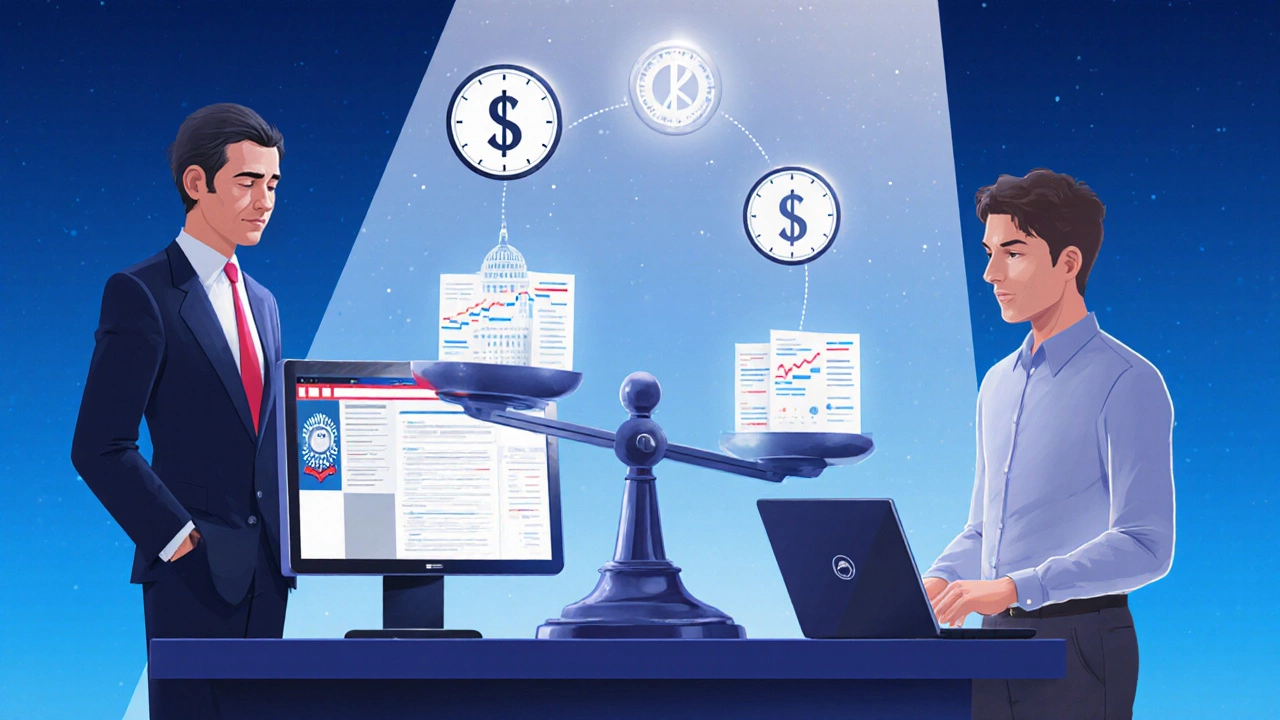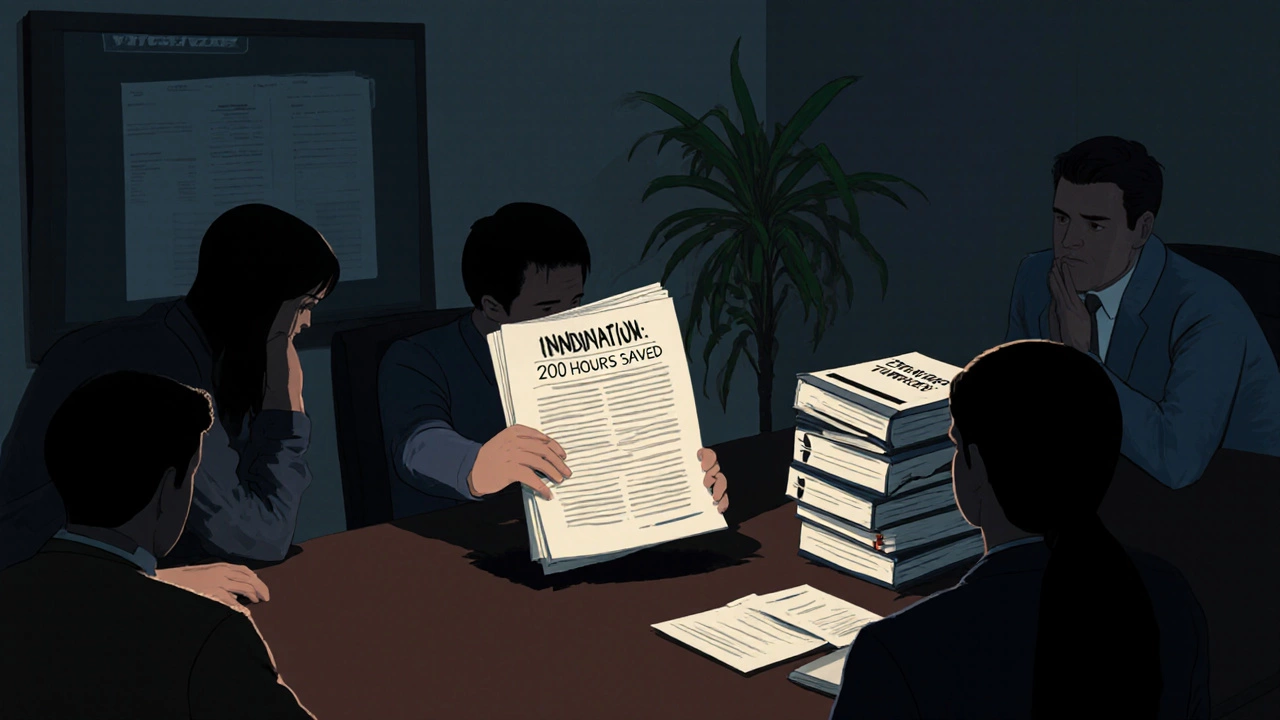Federal vs Private Sector Salary Calculator
Compare federal government salaries with private sector equivalents based on your position level. Understand how pay differences accumulate over time.
Salary Comparison Results
Based on 2025 federal pay scales and private sector averages
Based on the data from the article, federal pay hasn't kept up with inflation since 2010. A GS-12 in 2025 earns about the same real wage as in 2008.
Over 5 years, this pay gap could mean $125,000 more in the private sector.
More than 1 in 5 federal employees leave their jobs within five years. That’s not a small number-it’s a quiet crisis. People don’t walk away from federal jobs because they’re bored. They don’t quit because the pay is terrible. The reasons are deeper, messier, and more personal than most people realize. If you’re thinking about joining the federal workforce-or already in one-you need to know what really drives people out.
It’s Not Just About Pay
Many assume federal jobs are golden tickets because of steady pay and benefits. And sure, the salary isn’t bad. But here’s the catch: pay hasn’t kept up with inflation since 2010. A GS-12 in 2025 earns about the same real wage as in 2008. Meanwhile, private sector roles in tech, healthcare, and logistics have surged ahead. A software engineer in Virginia might make $120,000 at a defense contractor and get stock options. In the same role at the Department of Defense? Maybe $95,000 with no equity. That gap adds up over time.
And don’t get fooled by the myth of "lifetime security." If you’re in a role that’s being automated or restructured, your job isn’t safe. Agencies like the IRS and SSA have cut hundreds of positions since 2020 due to budget reallocations. Job security doesn’t mean job permanence.
Bureaucracy Drains Energy
Ever spent three weeks waiting for approval to buy a $200 printer? That’s not an outlier. It’s the norm. Federal employees spend an average of 11 hours a week just filling out forms, chasing signatures, and navigating procurement systems. One USDA employee told me she spent six months trying to get a new laptop because the IT department required seven levels of approval. She quit after her third failed request.
Decision-making is slow. Meetings are endless. Innovation is punished if it doesn’t follow a 50-page policy guide. People who joined to solve problems-like fixing food safety systems or improving veterans’ healthcare-find themselves stuck in paperwork loops. The mission gets lost in the process.
Leadership Is the Real Issue
Bad managers are the number one reason people leave. Not the pay. Not the hours. The boss.
Many federal supervisors were promoted based on seniority, not leadership skill. They don’t give feedback. They don’t protect their teams from upper-level chaos. They micromanage. A 2024 survey by the Partnership for Public Service found that 68% of federal employees who left said their manager was a key factor. One veteran from the Department of Transportation said, "I had a supervisor who didn’t know how to delegate. I was doing his job and mine. I left because I couldn’t take the stress anymore."
There’s no career path for good managers. There’s no training. There’s no accountability. You get promoted to lead a team-and then you’re on your own.

Work-Life Balance Is a Lie
"Flexible hours" sounds great-until you’re on call 24/7 for a crisis that never ends. Emergency responders in FEMA, border patrol agents, and cybersecurity staff at DHS routinely work 60-hour weeks during hurricane season or cyberattacks. There’s no overtime pay for most federal workers. No comp time. Just silence.
And remote work? It’s inconsistent. Some offices let you work from home three days a week. Others demand five days in the office-even if your job is reviewing documents on a laptop. The inconsistency breeds resentment. People who joined for stability end up burned out.
There’s No Room to Grow
Advancement in the federal system is painfully slow. It takes 18-24 months just to get promoted one grade level. And even then, you’re competing with dozens of others who’ve been waiting just as long. There’s no merit-based sprint. It’s a crawl.
Compare that to the private sector. A junior analyst at a startup can become a team lead in 18 months. In the federal system? You’re lucky if you get a promotion in five years. And if you’re in a small agency with limited roles? There’s nowhere to go. People leave because they feel stuck-not because they’re underpaid, but because they’re under-grown.
The Culture Doesn’t Reward Initiative
Want to propose a new system to cut processing time by 40%? Go ahead. But be ready for pushback. "That’s not how we’ve always done it" is the most common response. Innovation is seen as risky. Risk is punished. People stop trying.
I talked to a former EPA employee who built a digital tool to automate environmental compliance reports. He saved his team 200 hours a month. Instead of praise, he got a memo: "Please follow the standard template." He quit six months later.
When your ideas get buried under policy manuals, you stop having them. And when you stop having ideas, you stop caring.

People Leave for Better Mental Health
Depression, anxiety, and burnout are rising in federal agencies. The 2025 Federal Employee Viewpoint Survey showed that 42% of employees felt emotionally drained at least once a week. That’s up from 28% in 2019.
Why? Because they’re expected to do more with less. Staffing levels haven’t kept pace with workload. One VA hospital in Ohio went from 120 staff to 85 over five years. The remaining employees picked up the slack. No raises. No extra help. Just silence.
People don’t quit because they hate the job. They quit because the job is killing them slowly.
It’s Not All Bad-But It’s Not What You Think
Yes, federal jobs still offer solid benefits: health insurance, retirement plans, paid leave. Yes, some roles are meaningful. Yes, you can work from home in some agencies. But those perks don’t outweigh the daily grind if the system itself is broken.
The people who stay? They’re either deeply committed to the mission-like a social worker helping abused children-or they’re too tired to leave. Not because they love the job. But because they’ve given up trying to change it.
What Should You Do?
If you’re considering a federal job, ask these questions before you sign on:
- What’s the turnover rate in this office? (Ask during the interview-don’t be shy.)
- Who do people report to? What’s their leadership style?
- How often do teams get new tools or tech upgrades?
- Is there a clear path for advancement in this role?
- Do employees get recognized for extra effort?
If you’re already in one? Start small. Find one person who’s been there five years and ask them how they’ve stayed. Look for allies. Build a support network. Don’t wait for the system to fix itself. Fix your own experience.
The federal government needs good people. But it won’t keep them unless it starts listening.
Is the federal government hiring less these days?
Yes. Federal hiring has dropped 18% since 2020, according to OPM data. Agencies are hiring only for mission-critical roles-like cybersecurity, healthcare, and emergency response. Most administrative positions are frozen. If you’re looking for a job, focus on technical fields, not clerical ones.
Do federal employees get paid more than private sector workers?
It depends. For entry-level roles, federal pay is often higher. For mid- to senior-level technical roles-like engineers, data scientists, or IT specialists-the private sector pays 20-35% more. Benefits are better in government, but cash compensation isn’t. If you’re in a specialized field, you’re likely leaving money on the table.
Can you retire early from a federal job?
Yes, but only under specific conditions. Most federal employees can retire at age 62 with five years of service. Under FERS, you can retire at 56 with 20 years if you’re in a law enforcement or firefighting role. For others, early retirement requires a Voluntary Separation Incentive Payment (VSIP), which is only offered during agency-wide downsizing-not something you can request.
Are federal jobs still worth it for young professionals?
Only if you value stability over speed. If you want to climb fast, learn new skills quickly, or earn equity, the private sector wins. If you want predictable hours, strong benefits, and a clear retirement plan, federal work still has value. But don’t expect excitement or rapid growth. It’s a marathon, not a sprint.
What’s the biggest mistake people make when joining a federal job?
They assume the job will be fulfilling because it’s "public service." But if the agency is underfunded, understaffed, and poorly managed, the mission won’t matter. The daily reality will. Don’t join for the title. Join for the work-and make sure the work is actually doable.
